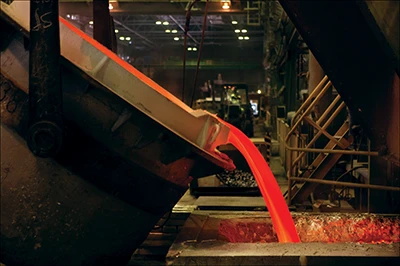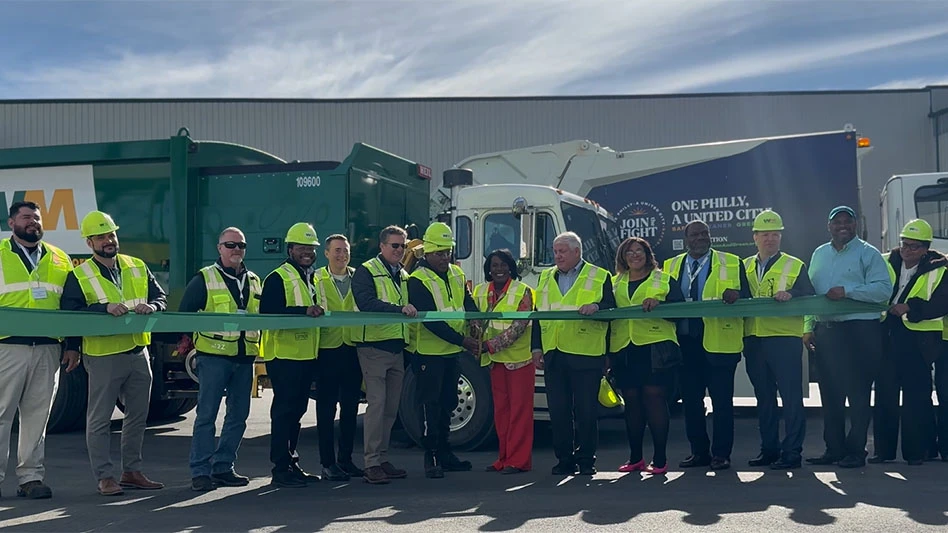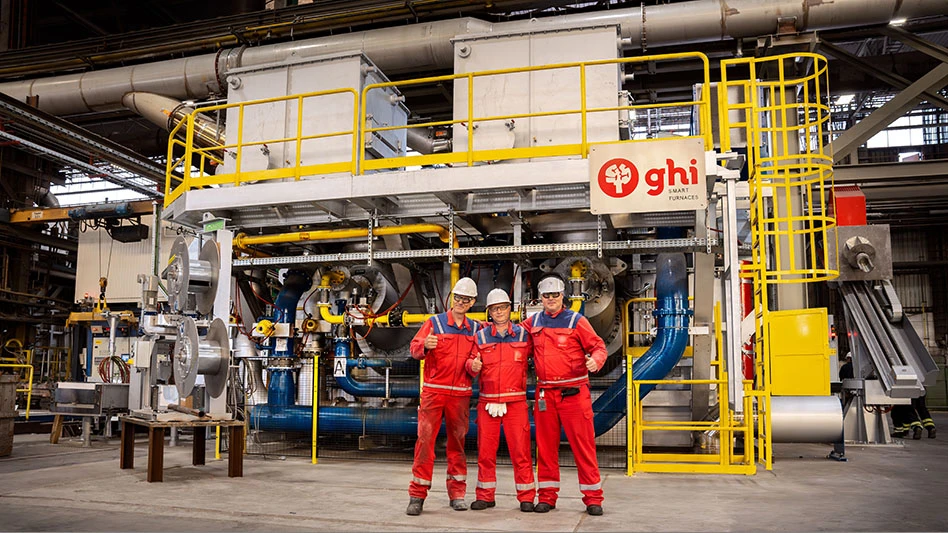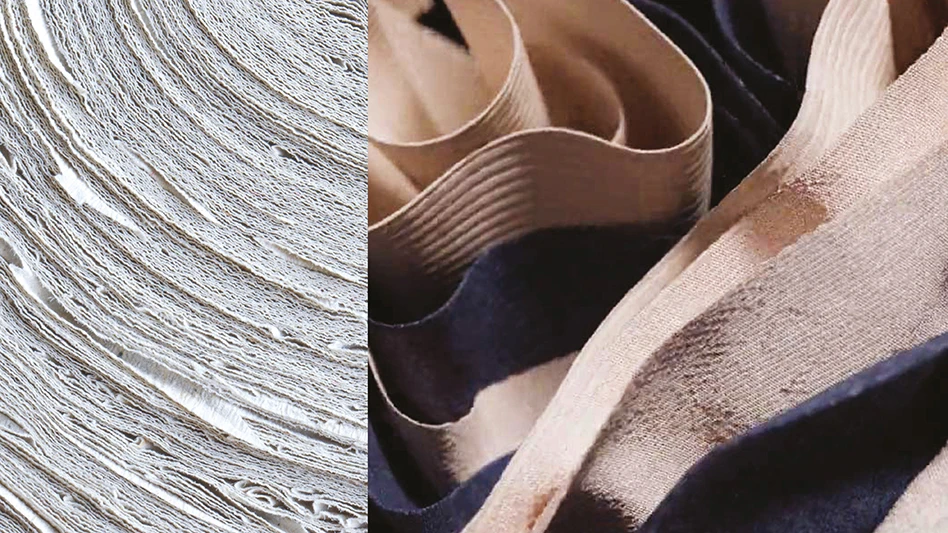
Aluminum may be a metal in an oversupply situation, but if noncompetitive capacity is what is eliminated then smelters in the Middle East may be in better shape than those in many other parts of the world.
Speaking to attendees of the 2014 Middle East Metals Recycling Conference, Richard Mayenknecht of Saudi Arabia-based Ma’aden Aluminum noted that low energy costs in that nation helped convince Alcoa to become a joint venture partner in the Ma’aden facility.
Mayenknecht’s background is with Alcoa, but he accepted the Ma’aden position, which entails helping to manage a facility resulting from a $10 billion investment made by Alcoa and a Saudi mining company.
The integrated aluminum complex includes a bauxite mine, alumina refinery, aluminum smelter and can sheet facility.
Although mining and alumina refining are part of the joint venture investment, Mayenknecht says another goal of the project was “to provide a consistent destination for [aluminum] scrap units.”
Stephan Schwarz of German recycling company the ALBA Group also noted that “expensive energy in Germany versus affordable energy in Middle East” is an important factor in making aluminum production competitive in the Middle East region.
Schwarz said the aluminum market in early March 2014 is witnessing primary aluminum “prices coming down while LME stocks are still increasing.” The premium being paid for scrap is increasing, however, which is likely a reflection of the energy savings of secondary production. “Aluminum consumption grows relatively more than the accumulated amount of scrap,” Schwarz added.
Developments in China will continue to affect the fortunes of aluminum recyclers in the future, Schwarz predicted. “China still is very hungry and asking for aluminum, but in 2025 China will turn around [and possibly] deliver scrap to the global market.”
Analyst Will Adams of FastMarkets Ltd., London, described aluminum globally as enjoying a “great demand profile, but in recent years it has become massively oversupplied.”
He described the price drops of the previous six months as being overdue, and said too many parties benefitted from higher pricing from 2010 to 2013. “It was beneficial to banks and to warehouses. Banks had money and needed to put that to work. Smelters didn’t want to cut back and needed someone to buy metal, and warehousing companies saw this as an opportunity to finance metal.”
While the early months of 2014 have witnessed falling prices and overcapacity in China is likely to cause more turbulence, all is not gloomy, according to Adams. “The advantage aluminum has is that demand is second to none. It is a metal with a great present and also with a great future.”
The 2014 Middle East Metals Recycling Conference was March 2-3 at the JW Marriott Marquis in Dubai.
Speaking to attendees of the 2014 Middle East Metals Recycling Conference, Richard Mayenknecht of Saudi Arabia-based Ma’aden Aluminum noted that low energy costs in that nation helped convince Alcoa to become a joint venture partner in the Ma’aden facility.
Mayenknecht’s background is with Alcoa, but he accepted the Ma’aden position, which entails helping to manage a facility resulting from a $10 billion investment made by Alcoa and a Saudi mining company.
The integrated aluminum complex includes a bauxite mine, alumina refinery, aluminum smelter and can sheet facility.
Although mining and alumina refining are part of the joint venture investment, Mayenknecht says another goal of the project was “to provide a consistent destination for [aluminum] scrap units.”
Stephan Schwarz of German recycling company the ALBA Group also noted that “expensive energy in Germany versus affordable energy in Middle East” is an important factor in making aluminum production competitive in the Middle East region.
Schwarz said the aluminum market in early March 2014 is witnessing primary aluminum “prices coming down while LME stocks are still increasing.” The premium being paid for scrap is increasing, however, which is likely a reflection of the energy savings of secondary production. “Aluminum consumption grows relatively more than the accumulated amount of scrap,” Schwarz added.
Developments in China will continue to affect the fortunes of aluminum recyclers in the future, Schwarz predicted. “China still is very hungry and asking for aluminum, but in 2025 China will turn around [and possibly] deliver scrap to the global market.”
Analyst Will Adams of FastMarkets Ltd., London, described aluminum globally as enjoying a “great demand profile, but in recent years it has become massively oversupplied.”
He described the price drops of the previous six months as being overdue, and said too many parties benefitted from higher pricing from 2010 to 2013. “It was beneficial to banks and to warehouses. Banks had money and needed to put that to work. Smelters didn’t want to cut back and needed someone to buy metal, and warehousing companies saw this as an opportunity to finance metal.”
While the early months of 2014 have witnessed falling prices and overcapacity in China is likely to cause more turbulence, all is not gloomy, according to Adams. “The advantage aluminum has is that demand is second to none. It is a metal with a great present and also with a great future.”
The 2014 Middle East Metals Recycling Conference was March 2-3 at the JW Marriott Marquis in Dubai.
Latest from Recycling Today
- ReElement, Posco partner to develop rare earth, magnet supply chain
- Comau to take part in EU’s Reinforce project
- Sustainable packaging: How do we get there?
- ReMA accepts Lifetime Achievement nominations
- ExxonMobil will add to chemical recycling capacity
- ESAB unveils new cutting torch models
- Celsa UK assets sold to Czech investment fund
- EPA releases ‘National Strategy to Prevent Plastic Pollution’





